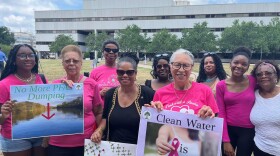If you walked into Lumberton High School today, you'd find exposed ductwork along the hallway ceilings from HVAC renovations that have been underway for months. The school is relying on federal funds to finish the job.
The final round of federal COVID-19 relief to schools allowed districts to pay for projects like this one that improve a school’s air quality. That was a major windfall for poor districts that rarely have the money to take on big repairs.
"Robeson County is not going to have the funds to do the projects of this magnitude that are overdue and well, well beyond their useful life," said Robeson County Schools' attorney Richard Schwartz.

Robeson County Schools is one of the poorest districts in the state. The school district receives the least county funding of any district in North Carolina, and by state law, counties are responsible for school infrastructure and repairs, not the state.
That the high school’s HVAC system was overdue for replacement is an understatement - the school's been using the same units since it opened in 1966. After replacement of the system got started, Schwartz says the project hit some bumps.
"They found mold and mildew and asbestos. So that changed the project," Schwartz said. "It slowed the project down. It had to be done in stages when students and staff weren’t present."
The work also can't be completed during summer break, because the air conditioning had to be shut off. In summer heat, that means more mold and mildew. So the project is scheduled to be finished over winter break.
Due to supply chain issues and delays nationwide, the Biden administration extended the deadline to spend down these funds until March 2026. When President Trump took office, his Department of Education told schools that new deadline would stand. Then the day of the original deadline, schools got an abrupt email from Secretary of Education Linda McMahon.
"Completely out of the blue, saying, 'Sorry, we're cutting off your federal funds, and if you relied on our previous extension, that's on you.' So it was a shock," Schwartz said.
The letter said extending deadlines for COVID-related grants years after the pandemic ended isn’t consistent with the Department's priorities.

Sixteen states and the District of Columbia sued, arguing this decision violates the Impoundment Control Act, a 1974 law that prevents presidential administrations from pulling back funds appropriated by Congress without following certain procedures.
So far, the courts have said that the extension should be reinstated for those states. That left the U.S. Department of Education with a dilemma - do they give more leeway to the states that sued them than the ones like North Carolina that didn't?
McMahon sent another letter in late June, saying the deadline would be extended again to all states. In North Carolina, that affected just four school districts that hadn't spent down all their funds - Halifax, Lenoir, Richmond and Robeson County Schools. But Robeson County has by far the most unspent funds on the line, at $14.3 million for the HVAC replacement and other projects.
"First of all, it was great news, but second of all, it was, 'Okay. What's going to happen next?'" Schwartz said.
Two last-minute funding decisions, two lawsuits, two reversals
The situation has parallels with the U.S. Department of Education's abrupt withholding of certain federal Title funds to all schools in July. In both cases, the announcement came late in the day as the funds were either set to be released or to expire. With the Title funds, the Department also backtracked following a lawsuit filed by multiple states.
Schwartz says the situation with the COVID-19 relief funds still feels uncertain, because the Department left room in its letter to change course again, depending on how the lawsuit shakes out. Plus, it changed the way funding goes out, so it could only be given as a reimbursement. Now, the district has to wait for each installment before it can continue work.
"We're not sitting on $14 million to pay for this. We've got to do it piecemeal," Schwartz said. "The contractors have been very, very good at working with us, but they could have walked off the job very easily."
Things look on track, for now. If everything goes well, students will have clean air and a school that's no longer a construction zone by August, with final work complete by next January. But Schwartz says the whole ordeal underscores how hard it's been for schools to adapt to the U.S. Department of Education's curve balls.
"If you can't rely on the promises of the federal government of the United States of America, that's an awful situation for school systems to be in," Schwartz said.
The lawsuit that Trump's administration is still battling continues to work its way through federal court, and Schwartz says it's unlikely to get resolved until after the work on the school is complete.







